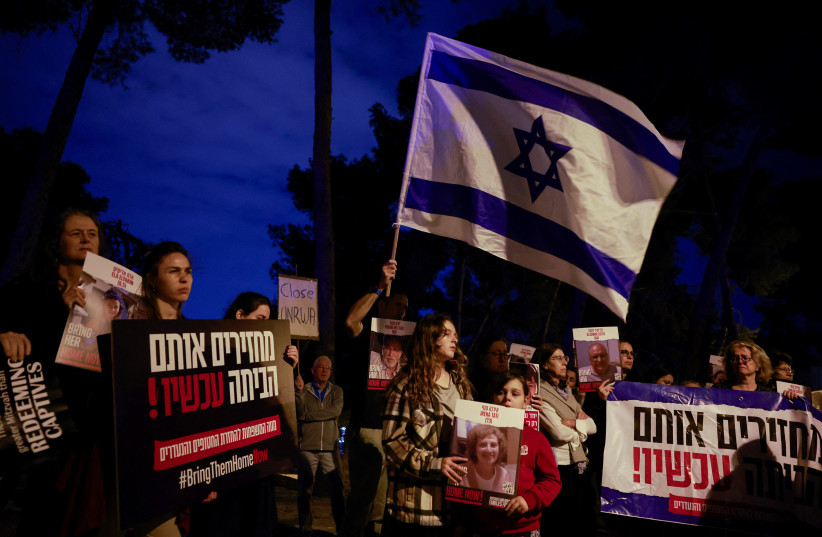Optimism was high Sunday among Israeli, United States, and Qatari officials about the possibility of a deal to release some, but not all, of the hostages in Gaza, possibly within days.
The war cabinet met at night as Hamas sought an agreement that would see a pause in the fighting possibly for three to five days and Israel feared hostages could be killed unless a deal was completed, even a partial one.
“We are hopeful that we can get a significant -- significant number of hostages freed in the coming days,” Israel’s Ambassador to the United States Mike Herzog told ABC.
The Washington Post reported about the counters of a deal by which 50 female and child hostages would be freed in exchange for the Israeli release of 50 Palestinian women and minors jailed on security-related offenses.
US Deputy National Security Advisor Jon Finer told ABC, ”There has been significant progress, including in – in recent days, in recent hours.”
He and Herzog spoke 44 days after Hamas infiltrated southern Israel on October 7, killing over 1,200 people and seizing over 239 hostages. Among the hostages are passport holders from 33 countries, including the United States.

Pressure had been growing on Israel to reach a deal
Qatari Prime Minister Mohammed bin Abdulrahman bin Jassim Al-Thani, whose country is mediating the arrangement, told reporters in Doha on Sunday morning “I am now more confident that we are close to a deal that can bring the people safely back to their homes.
“When you come closer to the goal, your confidence levels are increasing, The sticking points are more practice, logistical, not something that represents the core of the deal.
The Qatari Premier added that it was also important to ensure humanitarian assistance to Gaza.
“We see the people are suffering from starvation, people are lacking power, clean water, sanitation, the hospital is lacking fuel. These are the most important things, it should not be relevant to the deal, but if the deal is going to facilitate that, then we hope it happens as soon as possible,” he said.
Finer told ABC that a hostage agreement that included a prolonged pause in the fighting “would also make it much easier to both bring humanitarian assistance into Gaza and also distribute that assistance throughout Gaza.
“That’s a priority for us separate and apart from any hostage deal, but certainly a deal and a pause would make that easier to do. And that’s been a major challenge up till now,” he said.
Israel has opposed a ceasefire, even a partial one, fearing it would harm its military campaign to oust Hamas from Gaza, a goal that US President Joe Biden supports.
But the US public has not overwhelmingly supported his policy choices on Israel, particularly in light of the high Palestinian death count in Gaza, which Hamas has asserted is over 13,000 due to war-related violence.
NBC reported that a poll it conducted from November 10-14, showed that only 34% of voter approved of Biden’s stance in support of Israel.
UN Secretary General Antonio Guterres called for an immediate ceasefire on Sunday.
“This war is having a staggering and unacceptable number of civilian casualties, including women and children, every day. This must stop,” Guterres said..
He took issue in particular that two UN Relief and Works Agency schools sheltering Palestinians, were struck in the last 24 hours. “Dozens of people – many women and children – were killed and injured as they were seeking safety in United Nations premises,” Guterres stated.
Israel came under International fire in particular for its decision to send the IDF into Al-Shifa hospital, which the IDF has stated is also used by Hamas for military purposes and is a site where hostages are held.
The IDF claimed that in particular on Sunday, it had proof that captive IDF Corporal Noa Marciano, 19, whose body it found in Gaza last week, had been killed at Al-Shifa hospital.
On Sunday a team led by the World Health Organization that visited Al Shifa, Gaza's biggest hospital, described it as a "death zone," days after advancing Israeli forces seized the premises to root out an alleged underground Hamas command center.
The WHO team reported signs of gunfire and shelling and a mass grave at Al Shifa's entrance, and said it was making plans for the immediate evacuation of 291 remaining patients, including the war-wounded, and 25 staff.
Some 31 premature babies were evacuated from Al Shifa on Sunday in a joint operation by the U.N. and Palestinian Red Crescent and will be taken over the southern Rafah border crossing to Egypt for hospitalization there, Gaza's health ministry said.
Eight premature babies previously died at Al Shifa for lack of electricity and medication crucial to care, it said.
Hundreds of other patients, staff and displaced people who were sheltering in Al Shifa left on Saturday, with Palestinian health officials saying they were ejected inhumanely by Israeli troops and the military saying the departures were voluntary.
Russia and Iran's foreign ministers on Sunday called for a ceasefire in Gaza and said that urgent assistance must be given to the civilian population there.
Russia said Foreign Minister Sergei Lavrov spoke to Iranian Foreign Minister Hossein Amirabdollahian at the request of Tehran.
"During the conversation, main attention was focused on the current situation in the zone of the Palestinian-Israeli conflict," Russia's foreign ministry said.
"General concern was expressed about the ongoing armed confrontation in the Gaza Strip," it said. "The need for an early ceasefire and urgent assistance to the affected civilian population was stressed."
Russia, which has relationships with Iran, Hamas and major Arab powers as well as with the Palestinians and with Israel, has repeatedly accused the United States and the West of ignoring the need for an independent Palestinian state within pre-1967 borders.
Reuters contributed to this report.
